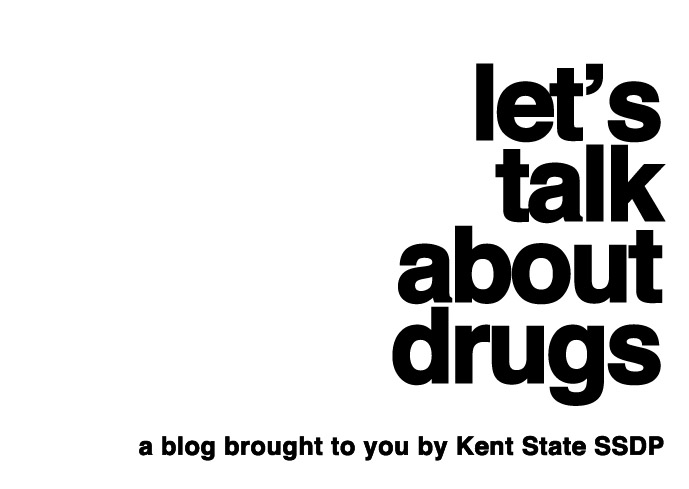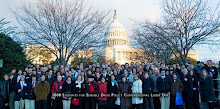Sunday, February 6, 2011
SSDP at CPAC 2011
This week KSU SSDP as well as members from many different chapters will converge onto the Conservative Political Action Conference in Washington DC. Here we will be voting in a straw poll for Gov. Gary Johnson. Gov. Johnson has been a strong voice in the movement for reforming current drug policies. In 1999 during his second term as Governor of New Mexico, Johnson took a strong stance on marijuana legalization, and has said that the other illegal drugs should be treated from a health issue instead of a legal one. He has been quoted as saying "I came to the conclusion that 90 percent of the problem was prohibition related” when talking about his stances on the drug war issue, with Myrtle Beach Tea Partiers (see link at bottom). His stances on this issue have even garnered the support of famous republican figures such as William F. Buckley.
Should this man become president, I believe that he would take America out of the downtrodden economy that we have now. For proof, I present his only held elected position. When he came into the gubernatorial position in New Mexico the state was suffering from a yearly budget increase of 10%. Through his policies and his strong use of veto power, Johnson cut this increase out and in fact left the New Mexican Economy with a large surplus. His economic policies are driven by his business minded approach, which stems from his years in college where he would make money by being a door to door handyman. That business grew and became a multimillion dollar business and provided him with the capital to be elected in the first place. He has since sold that business and is concentrating on activism; Sitting on the advisory board for our own SSDP and also Students for Liberty, a student political organization. He has also started his own 501(c) (4) committee called Our America Initiative (http://ouramericainitiative.com/) whose mission statement reads “OUR America Initiative seeks to broaden the parameters of the public policy debate of current topics in the national arena. We look to enlighten the population about civil liberties, free enterprise, limited government, and traditional American values. It is our aim to increase the amount of discussion and involvement regarding all-important issues.”
On other Issues, Johnson pushed to give school vouchers to all K-12 students in New Mexico, in order to allow them to go to school where they and their parents wished. He attempted this twice during his second term, but was unsuccessful in pushing it through the democratically controlled congress of the time. (See link at bottom)
Read more: http://www.thesunnews.com/2011/02/01/1955144/mb-tea-party-hears-from-presidential.html#ixzz1DD8JQcDJ
http://www.nytimes.com/2000/01/31/us/parents-lead-way-as-states-debate-school-vouchers.html?pagewanted=1&src=pm
Dave Goldshtein is a member of Kent State SSDP
Monday, January 24, 2011
Food for Thought
The following blog written by KSUSSDP member Steve Larson:
Food for thought…hmmm maybe just fees please
Fresh foods are a great way to bring your mind and body to a healthier state, but sometimes their cost keeps those who need them the most from enjoying their benefits. So let’s say you take matters into your own hands and grow your own vegetables in your house to supply your family with a healthy substitute to the heavily processed chemical-laden foods that are sold in super markets. Seems like a good idea, but what if you were fined thousands of dollars because the municipal inspectors thought you were growing marijuana instead? Sounds like something that can only happen in a bad dream, right? Wrong. Len Gratto of Missions, British Colombia is one of the many citizens who have been fined $5,200 or even up to $10,000 in fees and repair orders for not growing marijuana. All Gratto did was grow cucumbers in his basement.
These marijuana grow-op searches, which are sometimes done illegally, are made possible through Grow-op bylaw programs that allow municipal inspectors to enter homes with abnormally high hydro usage — about 93 kilowatts per day or more — and look for evidence of illegal marijuana grow-ops for public safety reasons. The sad part of about this is that the evidence they find does not necessarily mean the household is or has grown marijuana. For instance, Gratto stated “the ‘laughable’ evidence against him consists of pictures of some ‘dirt’ on the basement wall and ‘a furnace pipe going up into the chimney, where it should be.’” This is just outrageous. I am pretty sure that dirt does not equal marijuana. There are many people that bring inside potted plants that cannot survive the winter or grow vegetables and cooking herbs indoors, all of which I will reiterate are not marijuana. Thankfully, Gratto, among many others, is not going to let his rights be abused like this and is willing to start an "imminent class action" law suit against Mission.
From 2008 to 2010, there were 362 Public Saftey Inspection Team searches of which 275 of them were given the fees of $5,200! Councilor Jenny Stevens of Missions, who initially supported this program, believes that around half of these homeowners were innocent. She says, “My biggest worry is about 50 per cent of these people were subjected to embarrassment and innuendo. I’m very concerned about the threat of litigation.”
These laws do not just embarrass and damage the reputation of the town citizens, but can even lead them to the usage of prescription drugs. For instance, in another innocent victim’s case in which Drew Smith said that he had to get sedatives because he couldn’t sleep at night with the stress and embarrassment in the neighborhood. Thank you drug laws for ruining even more innocent lives, as if the drug cartel violence in Mexico and overcrowded prisons in the US were not enough.
http://www.theprovince.com/news/Mission+homeowner+fined+growing+cucumbers/4083756/story.html
Thursday, January 20, 2011
Former President Vicente Fox Urges Mexico to Legalize Drugs
Fox, who was once a strong proponent of the drug war, now acknowledges that the prohibitionist model does not work. He cites the loss of tourism, of talented and professional people over the border to the United States, and the state of fear as costs too great to bear.
The death toll topped 12000 in 2010 and intense conflict continues as the cartels vie for power.
"...it is not only in people's income, in investment, but also in the collective psychology. There is fear in the country. And when you have an environment where there is no harmony, no peace and tranquility then no human being can make the best of themselves."
Tuesday, November 30, 2010
Santa Fe Police Raid School Greenhouse: Find Tomatoes
Friday, October 8, 2010
Conference time!
Wednesday, September 29, 2010
The Student Movement to End the War on Drugs, or How I Learned to Stop Worrying and Fight the Drug War.
Wednesday, September 8, 2010
Magic mushrooms ingredient may ease end of life anxiety

http://edition.cnn.com/2010/HEALTH/09/06/magic.mushrooms.ease.anxiety/index.html#fbid=K34l3diZN1a&wom=true
- Terminally ill cancer patients may get some relief from a guided "trip" on the drug psilocybin
- One to three months after taking psilocybin, patients reported feeling less anxious
- Patients said their experience gave them a new perspective on their illness
(Health.com) -- Terminally ill cancer patients struggling with anxiety may get some relief from a guided "trip" on the hallucinogenic drug psilocybin, a new study suggests.
The study included 12 patients who took a small dose of psilocybin -- the active ingredient in "magic mushrooms" -- while under the supervision of trained therapists. In a separate session, the participants took a placebo pill, which had little effect on their symptoms.
By contrast, one to three months after taking psilocybin the patients reported feeling less anxious and their overall mood had improved. By the six-month mark, the group's average score on a common scale used to measure depression had declined by 30 percent, according to the study, which was published in the Archives of General Psychiatry.
Can psychedelic drugs treat depression?
In follow-up interviews with the researchers, some patients said their experience with psilocybin gave them a new perspective on their illness and brought them closer to family and friends.
"We were pleased with the results," says the lead researcher, Charles Grob, M.D., a professor of psychiatry at Harbor-UCLA Medical Center, in Torrance, Calif.
Notably, the psilocybin did not aggravate the patients' anxiety or provoke any other unwanted effects besides a slight increase in blood pressure and heart rate.
Health.com: 7 types of therapy that can help depression
Grob's findings are "important because he's showing that you can administer these compounds safely to cancer patients with anxiety," says Roland Griffiths, Ph.D., a professor of psychiatry and neuroscience at the Johns Hopkins University School of Medicine, in Baltimore.
"They're not substances that should be used recreationally or casually, but nonetheless it appears that we can conduct research with these compounds safely," adds Griffiths, who was not involved in the study but has researched the therapeutic effects of psilocybin. (He and his colleagues are currently enrolling patients in a similar study that will use larger doses of the drug.)
Researchers investigating the therapeutic potential of psilocybin and other hallucinogens have been keen to demonstrate the safety of the drugs in clinical settings.
Health.com: Supplements for depression: what works
Psychiatrists and psychologists began exploring the effects of hallucinogens on the mood and anxiety of dying patients in the 1950s, but the research stopped abruptly when psilocybin, lysergic acid diethylamide (LSD), and other mind-altering drugs were outlawed in the 1970s.
The Food and Drug Administration (FDA) has approved a handful of small studies involving hallucinogens since the 1990s, but the field is still emerging.
Grob's study is the first of its kind in more than 35 years. It was funded by private foundations and the Heffter Research Institute, a nonprofit organization based in Santa Fe, New Mexico, that has been a major sponsor of the second-generation hallucinogen research.
The patients in the study were all close to death (10 of the 12 have since died), and they had all diagnoses of anxiety or acute stress relating to their prognosis.
"We were really looking for people who were really struggling with the predicament that they found themselves in," Grob explains.
Health.com: What an anxiety disorder feels like
During the psilocybin sessions, which lasted six hours, the patients lay on a couch and listened to music through headphones.
Although they spoke only briefly to the therapists while under the influence of the drug, they continued to meet periodically with the research staff for six months to discuss their experience and to fill out questionnaires assessing their mood and anxiety levels.
"I think we've established good grounds for continuing the research," Grob says. "That's the goal right now, just to develop more studies."


